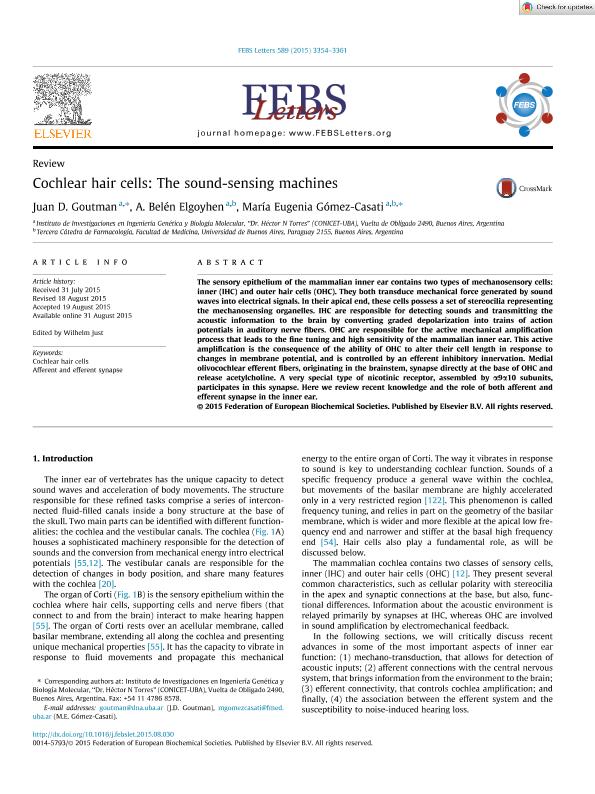Mostrar el registro sencillo del ítem
dc.contributor.author
Goutman, Juan Diego

dc.contributor.author
Elgoyhen, Ana Belen

dc.contributor.author
Gomez Casati, Maria Eugenia

dc.date.available
2016-02-01T20:32:34Z
dc.date.issued
2015-08-31
dc.identifier.citation
Goutman, Juan Diego; Elgoyhen, Ana Belen; Gomez Casati, Maria Eugenia; Cochlear hair cells: The sound-sensing machines; Elsevier; Febs Letters; 589; 22; 31-8-2015; 3354–3361
dc.identifier.issn
0014-5793
dc.identifier.uri
http://hdl.handle.net/11336/3948
dc.description.abstract
The sensory epithelium of the mammalian inner ear contains two types of mechanosensory cells:inner (IHC) and outer hair cells (OHC). They both transduce mechanical force generated by soundwaves into electrical signals. In their apical end, these cells possess a set of stereocilia representingthe mechanosensing organelles. IHC are responsible for detecting sounds and transmitting theacoustic information to the brain by converting graded depolarization into trains of actionpotentials in auditory nerve fibers. OHC are responsible for the active mechanical amplificationprocess that leads to the fine tuning and high sensitivity of the mammalian inner ear. This activeamplification is the consequence of the ability of OHC to alter their cell length in response tochanges in membrane potential, and is controlled by an efferent inhibitory innervation. Medialolivocochlear efferent fibers, originating in the brainstem, synapse directly at the base of OHC andrelease acetylcholine. A very special type of nicotinic receptor, assembled by a9a10 subunits,participates in this synapse. Here we review recent knowledge and the role of both afferent andefferent synapse in the inner ear.
dc.format
application/pdf
dc.language.iso
eng
dc.publisher
Elsevier

dc.rights
info:eu-repo/semantics/openAccess
dc.rights.uri
https://creativecommons.org/licenses/by-nc-nd/2.5/ar/
dc.subject
Cochlear Hair Cells
dc.subject
Afferent Synapse
dc.subject
Efferent Synapse
dc.subject
Noise Induced-Hearing Loss
dc.subject.classification
Otorrinolaringología

dc.subject.classification
Medicina Clínica

dc.subject.classification
CIENCIAS MÉDICAS Y DE LA SALUD

dc.title
Cochlear hair cells: The sound-sensing machines
dc.type
info:eu-repo/semantics/article
dc.type
info:ar-repo/semantics/artículo
dc.type
info:eu-repo/semantics/publishedVersion
dc.date.updated
2016-03-30 10:35:44.97925-03
dc.journal.volume
589
dc.journal.number
22
dc.journal.pagination
3354–3361
dc.journal.pais
Países Bajos

dc.journal.ciudad
Amsterdam
dc.description.fil
Fil: Goutman, Juan Diego. Consejo Nacional de Investigaciones Científicas y Técnicas. Instituto de Investigaciones en Ingeniería Genética y Biología Molecular; Argentina
dc.description.fil
Fil: Elgoyhen, Ana Belen. Consejo Nacional de Investigaciones Científicas y Técnicas. Instituto de Investigaciones en Ingeniería Genética y Biología Molecular; Argentina. Universidad de Buenos Aires. Facultad de Medicina. Departamento de Farmacología; Argentina
dc.description.fil
Fil: Gomez Casati, Maria Eugenia. Consejo Nacional de Investigaciones Científicas y Técnicas. Instituto de Investigaciones en Ingeniería Genética y Biología Molecular; Argentina. Universidad de Buenos Aires. Facultad de Medicina. Departamento de Farmacología; Argentina
dc.journal.title
Febs Letters

dc.relation.alternativeid
info:eu-repo/semantics/altIdentifier/url/http://www.sciencedirect.com/science/article/pii/S0014579315007309
dc.relation.alternativeid
info:eu-repo/semantics/altIdentifier/doi/http://dx.doi.org/10.1016/j.febslet.2015.08.030
dc.relation.alternativeid
info:eu-repo/semantics/altIdentifier/url/http://onlinelibrary.wiley.com/doi/10.1016/j.febslet.2015.08.030/abstract
Archivos asociados
